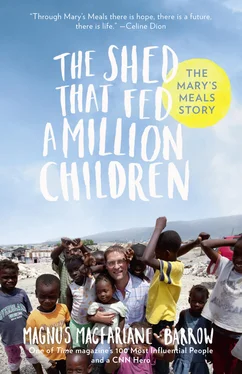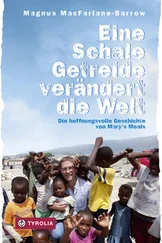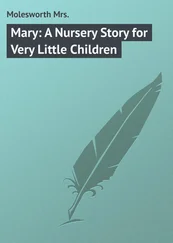‘Where do you like to play?’ asked Frank as he began to organize his team, and I realized he was talking to me.
‘Umm, up front – striker.’
‘Great. You and I will play up front together.’ He smiled. ‘Don’t worry. I’ll keep you right.’
And so it was that I ended up playing in a Celtic–Rangers match. Actually, I was playing directly against one of their most famous former players and recent captain of the national English team, Terry Butcher. He was a big man. I think he went easy on me during the game, although his kindness didn’t extend to letting me have many touches of the ball. In truth I didn’t play very well, missing a couple of chances that I should have scored. And we lost the match. A few of my friends from Dalmally had travelled down to watch me, something that meant a lot to me, although afterwards in the bar they had some fun analysing my performance.
This whole experience felt like God was giving me a little treat. A wonderful, surprise gift. Something completely unexpected but connected to some heartfelt desire (even a childish one that I might not dare to articulate as an adult) or longing of mine that only He understood. And a sense that He wanted me to know that He understood me. And this has happened to me many times since. Undeserved, unexpected, gratuitous gifts that can only be unwrapped when feeling like a small child.
Meanwhile there were lots of things to do which were a little less exciting. Now that this work seemed to have developed into an ongoing mission we realized we needed to register a charity. Originally the name we had written on the side of our old truck was Scottish Bosnia Relief . When the word ‘Bosnia’ became politically sensitive during the war, it began to create a risk when we drove through certain areas or border crossings and so we scrapped off those particular letters. After some time we decided to paste the word International in the untidy space between Scottish and Relief . After all, we reasoned, we were delivering goods to Croatia as well as Bosnia-Herzegovina, and who knew where else in the future? So we had named the organization: Scottish International Relief. My brother, Fergus, then spent some time doodling various ideas for a logo. We choose a blue Celtic cross he had drawn, with the letters SIR – the acronym we became known by for many years – written on it. This ancient symbol, a cross on top of a smaller circle, is a very familiar sight across Scotland and Ireland, representing the transition by our ancestors from Paganism to Christianity, from worship of the sun (the circle) to worship of Jesus (the cross). Next we needed a slogan, and once again round the family table we bandied about different ideas, finally agreeing on ‘Delivering Hope’. ‘Hope’ has always been my favourite word. We also briefly discussed whether this work should be an extension of Craig Lodge Family House of Prayer – which had existed as a registered charitable organization for several years – and therefore a Catholic organization, or whether we should be non-denominational. While we all felt this was a work of God and a fruit of Medjugorje, we also felt unanimously and strongly that this should be an organization open to people of all faiths and none. And so we set up a new non-denominational charity and, in addition to members of our family, we invited on to the first board two non-Catholic friends who had already done a huge amount of work. We worked with a lawyer in our nearest town, Oban, to write up a constitution and at our first, rather informal meeting we elected my brother-in-law Ken, Ruth’s husband, as Chairperson. This board would meet three or four times a year, while Julie and I, with huge support from Mum and Dad (despite the fact they were also running the retreat centre) did the daily work, with the help of a multitude of volunteers.
Julie, who among her other gifts fortunately had a talent for administration, took responsibility for thanking donors and recording their names and addresses. I did most of the driving within Scotland to collect the aid donations, as well as the planning and preparation for deliveries. This included communicating with our partners on changing areas of need, request lists, customs paperwork, route planning and trying to repair holes in the roof of our truck. I also wrote the appeals and newsletters we began to send to our growing band of supporters, and to my surprise found I enjoyed this very much. In fact, to make ends meet (I was still an unpaid volunteer living off my savings and Mum and Dad’s free lodging), I began writing a few articles on other unrelated topics and sold them to various publications. And, of course, a huge amount of our time was spent driving the truck back and forth across Europe. In the year since our first trip with the Land Rover I had driven to Bosnia-Herzegovina over twenty times.
While I learnt things every time I made one of those deliveries, I was learning at least as much from people who, in all sorts of incredible ways, were supporting our work at home. I was very deeply moved and challenged by some of the generosity that I experienced.
Mrs Duncan Jones lived in a little cottage – the sort you read about in fairy tales – at the end of a very rough track near the village of Kilmartin. We always enjoyed visiting her with our van to collect various goods – both her own donations and things she had collected from friends in the area. Each time we visited her she would give us wonderful bowls of home-made soup, and, ‘in order to provide sustenance on the journey to Bosnia’ she baked us the most delicious fruitcakes I have ever tasted. These cakes contained a truly amazing quantity of brandy. She would sometimes leave them for us to collect at a particular filling station on our road to Glasgow, neatly wrapped, along with a note of encouragement. Her husband, an Episcopalian minister, died shortly after we met her but her hard work and support of our efforts never wavered. Once, I remember visiting her to collect yet another pile of donations. When she served me my soup I noticed that, rather than a ladle, she used an old mug to fill my bowl. I began to look around her kitchen at her empty cupboards and shelves, and noticed nearly everything was gone. Worried, I asked her if she was OK.
‘Yes, fine,’ she smiled.
‘Are you moving house?’ I enquired.
‘No, no. I love it here. No, I just thought about those families in Bosnia returning to their homes with nothing at all. They need these sorts of things more than I do now. I mean, does an old lady like me, living on her own, really need a ladle? Or extra plates and pots?’
I trundled down the hill from her home, my van full of her household belongings and carefully wrapped cake on the seat beside me. In my rear-view mirror I could see Mrs Duncan Jones waving. She wore a wonderful huge smile.
I was being challenged in lots of other ways too. A few weeks prior to this, Julie and I (by now engaged to be married) were chatting on the last leg home from another trip to Bosnia-Herzegovina and she gently began to question me about my shyness – and my clothes. I had, to her dismay, just told her, quite smugly, that I could fit all of the clothes I owned (apart from my kilt) into one washing-machine load. For her, it was a horrible realization that I didn’t look this bad just because I was currently driving and loading trucks all day.
‘Well, I suppose that is why all of your clothes are that same sort of horrible grey colour,’ she said dryly after a short silence.
‘What do you think you will do after this finishes? Will you go back to being a fish farmer?’ she asked me.
‘I really just don’t know,’ I replied after a little thought. ‘What I am sure of, though, is that it won’t be something that has anything to do with people!’
Читать дальше












